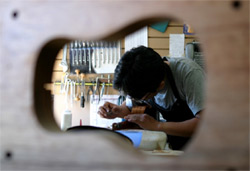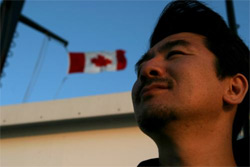
 When I was a boy, if I wasn't playing baseball or hanging out with my friends I was usually in my uncle's guitar shop. I used to pick up leftover tonewood pieces from garbage bins and make something out of them. My uncle owns a world-renowned guitar building company in Gifu, Japan. My father was the chief guitar builder there until 2002. He built exclusive custom-made guitars for musicians around the world for forty-two years. He often worked on weekends, so I used to accompany him to his workshop. I still remember looking up at all the acoustic guitars - which were taller than myself - and also trying my hand at Japanese saws and hammers. When I was about seventeen, music became my life and guitars fascinated me. I developed a strong respect for my father as a luthier. When I turned twenty, I accompanied my uncle on his business trip to Los Angeles. I found myself immersed in a world I only knew about through magazines and CDs. The trip had an enormous impact on me. I was electrified by the culture, food, language and everything else and wished someday to live in Noth America. As a typical Japanese university graduate, I became a corporate employee, a "salaryman." With an irresistible passion for guitars and wood working, I started doing some woodwork in a corner of my uncle's guitar shop on weekends; I yearned "to pursue my dream and live without regret." Back then, at first, my father didn't allow me to build an instrument. He didn't even let me touch the woodworking machine tools. I was only allowed to use a workbench and traditional hand tools like saws, chisels and planers. Nevertheless, with leftover pieces of mahogany, rosewood and spruce from the workshop, I managed to make variety of things including pencil stands, jewelry boxes, cutting boards and Japanese wooden "Geta" sandals. I'm grateful that the training I had in those days helped me to estabilish my instrument building style today. 
Working on a ukulele neck
After I mastered the hand tools, I moved on to make my first instrument: a ukulele. Why not a guitar? I followed my father's advice: "Ukulele-making is not as simple as you might think. It involves fundamentals one should know for making guitars." I will never forget the moment I completed my first ukulele. I decided to quit my job and live as a luthier. In December 1996, I came across a special article about Larrivée Guitars in the Japanese magagine "Acoustic Guitar (Book 4)." The renowned Canadian guitar builder, Jean Larrivée, had combined traditional craftsmanship with high tech. This impressed me and I hoped to see his guitar shop with my own eyes. It was not long after that I found myself in Vancouver with my ukulele. I was lucky to have a chance to speak with Jean Larrivée himself who was planning to build ukuleles. He let me visit his shop twice a week for the next three months. I learned that the method of guitar building in Canada was quite different from the methods used by most of the Japanese builders. I earnestly wished I could work with these craftmen, even for a short time. After returning to Japan, I applied for a working holiday visa hoping that this would allow me to work at Larrivée Guitars. While waiting for the visa, I endeavoured to work hard at my uncle's guitar shop where I witnessed some of Japan's master craftsmen's handwork. During this time, I was given full responsibility as a fretting expert to finish fingerboards on every guitar that was built in the shop. 
On the ferry from Vancouver to Nanaimo, on my way to select tone woods: maple and spruce
In 1999, I was granted a one-year working holiday visa to come to Canada and my dream to work at Larrivée Guitars came true. Once there, I was overwhelmed by the artistic inlays and the CNC machine in the shop. I was there to work, but also felt as if I was taking a shop tour every single day, and exchanged information with craftsmen in different sections. I made several friends through guitar building there. By the end of my stay, I came to believe that Vancouver was the place for me to further and deepen my understanding of guitar building where the world's best spruce and maple trees were found locally and the humidity was thought to be ideal for building instruments. I decided to move to Vancouver. In April 2000, I returned to Japan and founded the "Majesty" Brand. I handpicked and purchased Koa wood in Hawaii to build ukuleles and chose "Koa Enterprises" as the company name. My ukuleles have been sold at a ukulele specialty shop, Akio Instrument, in Ochanomizu, Tokyo since January 2001. I started a shop at the back of my home and began to build ukuleles. I was producing four handmade ukuleles a month, which were available in about twenty kinds of models. In June 2002, I moved to Vancouver, Canada, as a landed immigrant and relocated to North Vancouver. |
||
Copyright © 2025 Yusuke Kawakami |
